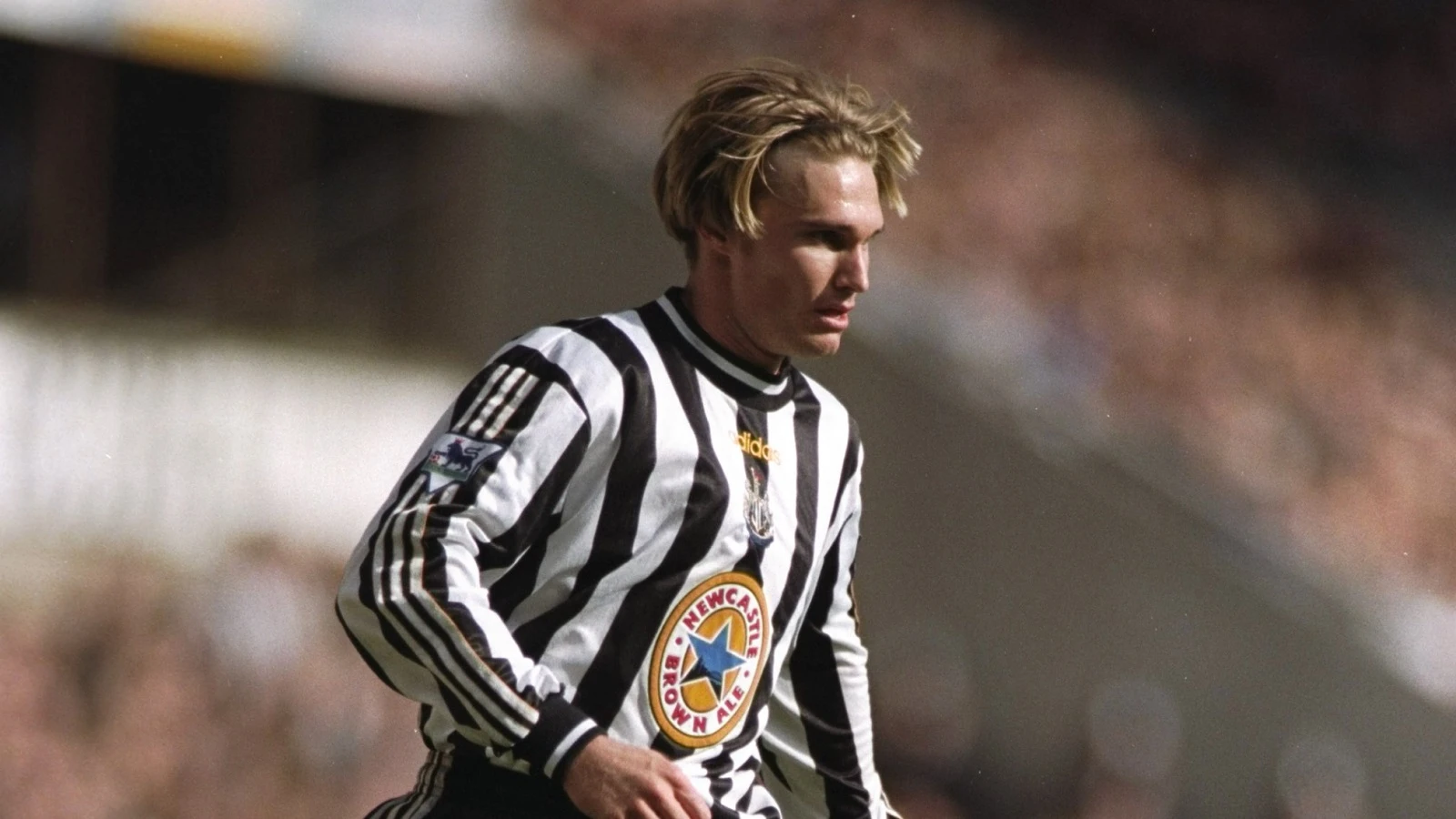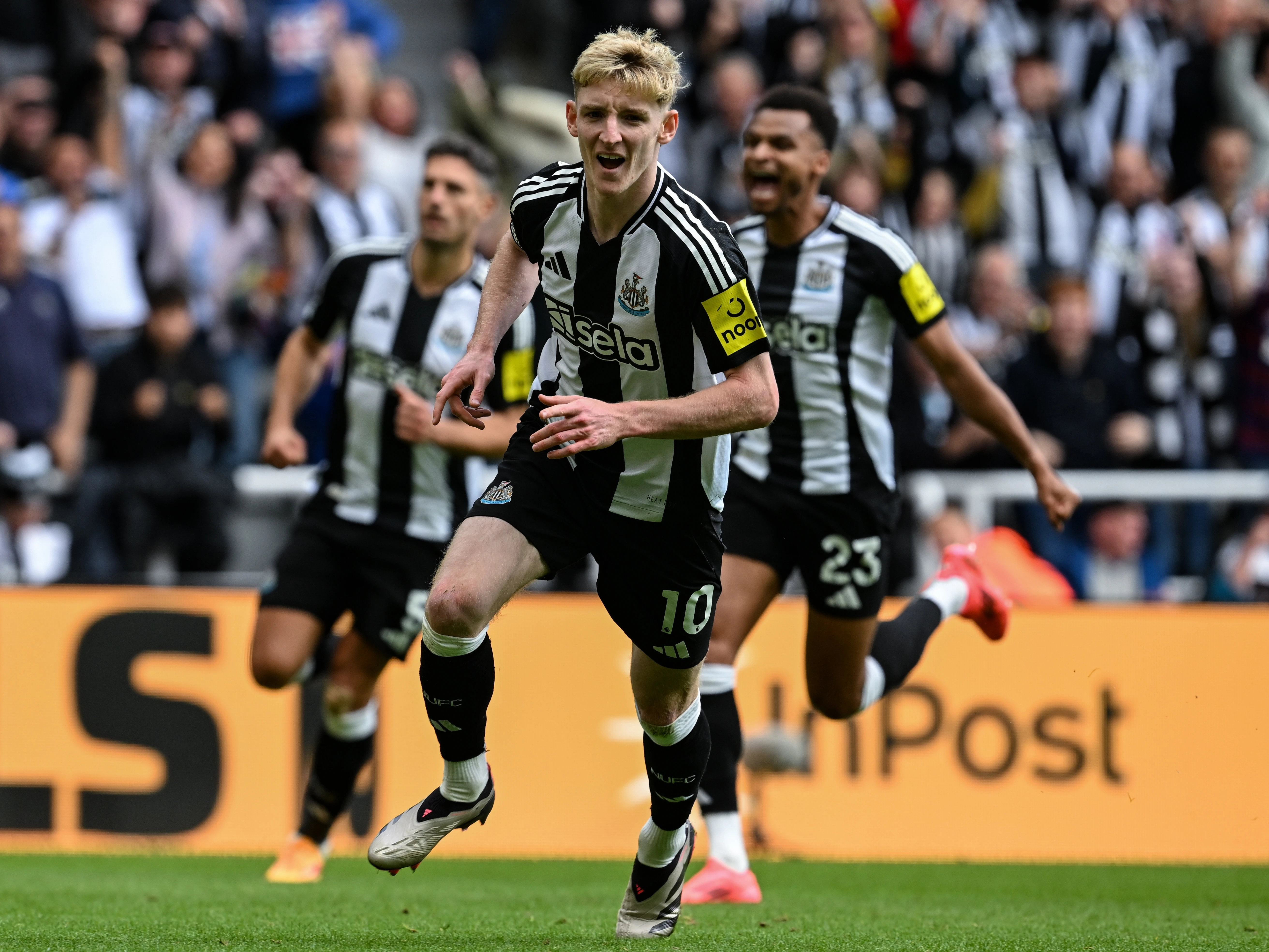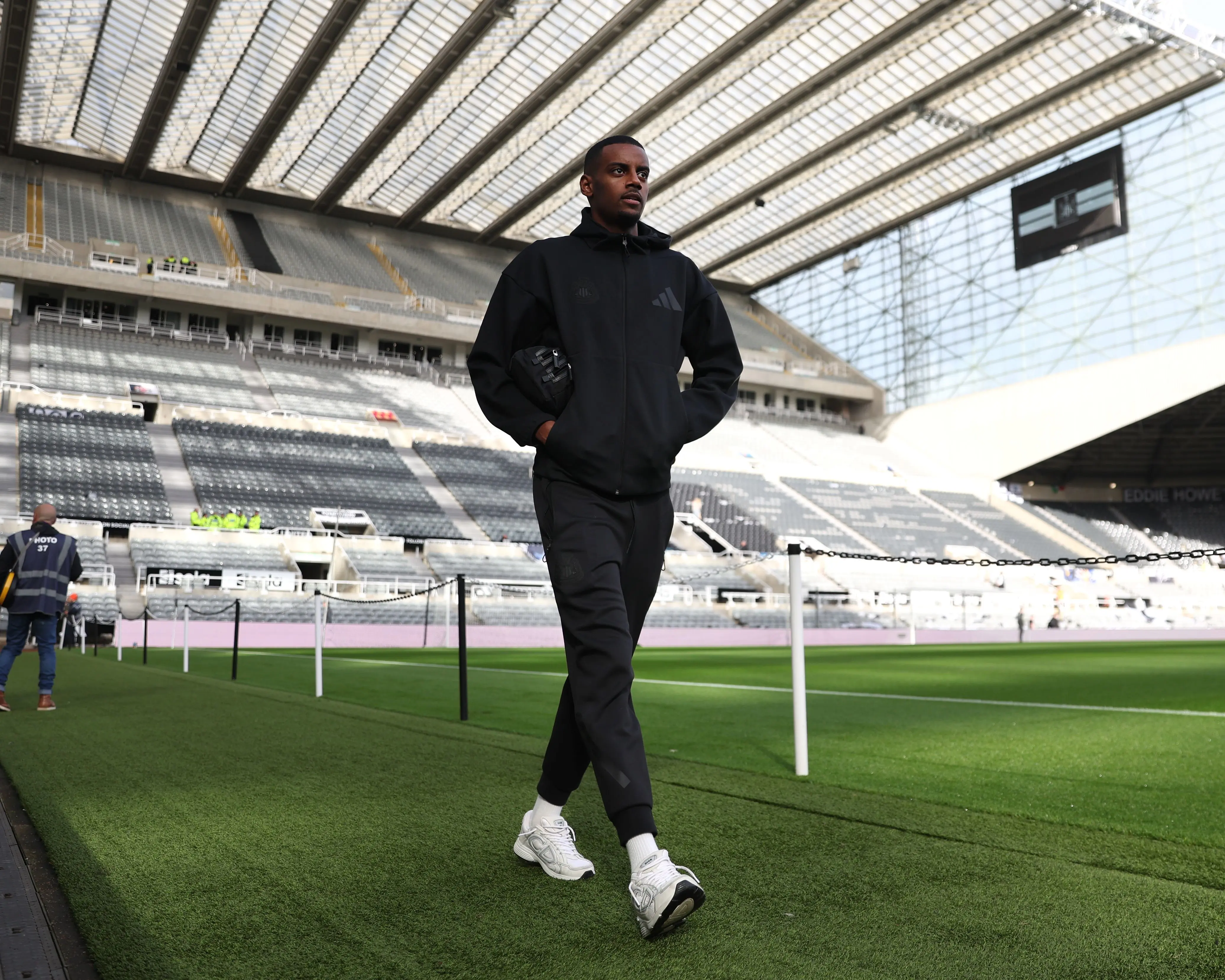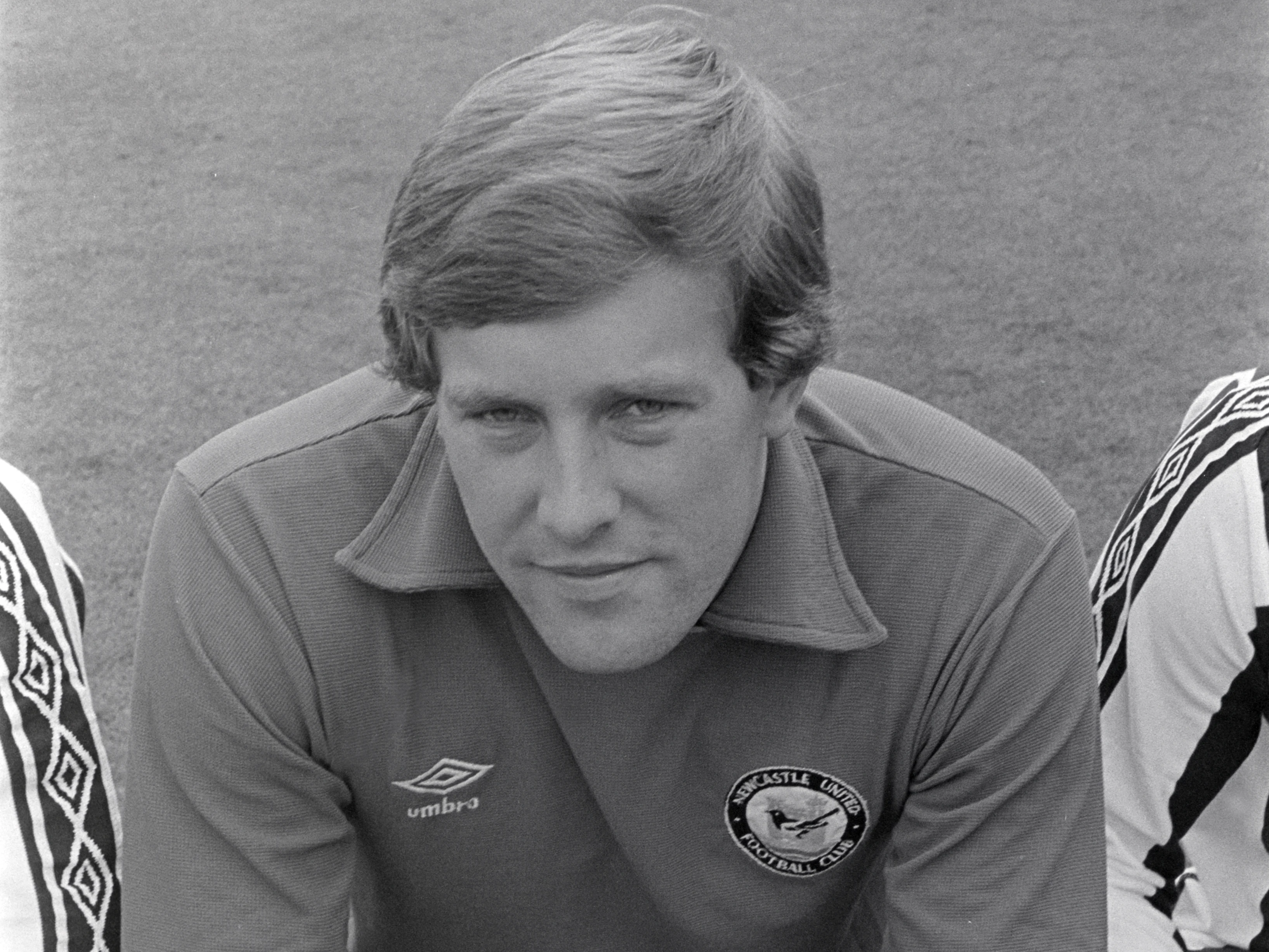Ahead of Sunday’s memorable victory against Manchester United, we chatted to ex-Swedish international Andreas Andersson, who famously notched one of his four Magpies goals against the Red Devils at Old Trafford. The blonde-haired frontman played in the Champions League before and after his Newcastle career and also represented his country at the 2002 World Cup, though he was restricted to less than 30 starts after moving to Tyneside from Milan. Now a youth coach in his homeland, Andersson kindly spent half an hour on the phone to UNITED a week ago, and the full interview is now available for you to read online, too…
Andersson holds off a challenge from Chelsea's Graeme Le Saux at Stamford Bridge.
Before we speak about Newcastle, is it true that you came to England for a trial with Liverpool as a young player?
I wasn’t actually that young! I think it was at the beginning of 1995, so I was 21 years old when I was in Liverpool for a trial. I don’t know if it was for a week, or five days, or something like that. And I was actually at Birmingham in the autumn of ’94, so I was in England twice. I met John Barnes, before I played (with him) at Newcastle, when he was at Liverpool. I have a picture with him from the beginning of ’95, so yes, that’s true!
The 1996 Allsvenskan season was an impressive one for you, as you won the title with IFK Göteborg and were the league’s top goalscorer. In the context of your career, how important was that year?
Of course, it was important. But the year before was also very important. I scored a lot of goals playing for Degerfors, a team in the top league, and that gave me the opportunity to go to Göteborg. And of course it meant a lot to play in Göteborg, score a lot of goals and play in the Champions League.
You joined Milan not long after your Göteborg teammate, Jesper Blomqvist. Do you believe your performances against Milan in the Champions League played a big role in the two of you moving there?
Yeah, I think so. We played well against them. I mean, we both scored goals against them. So it played a big role I think, yes.
When did you first hear of Newcastle’s interest? Was it an easy decision for you to move to England?
I heard about it at the beginning of ’98. I didn’t know so much about Newcastle; I knew they did well a couple of years before, when they almost won the league. I knew, of course, about Shearer, and there were a lot of top players at the club.
It is not an easy decision to leave a club, I think, but Newcastle was a big club, in England, and after meeting with the club and Dalglish it was an easier decision to make.
You scored your first goal for Newcastle in your tenth game, against Barnsley at St. James’ Park. You celebrated by running straight into the crowd! How did that feel?
Kind of relief, I think! When you are a goalscorer, you like to score goals, and I was struggling to score my first goal. But finally I did it, so I was very happy of course.
Just five days later, you gave Newcastle the lead at Old Trafford. You were one-on-one against Peter Schmeichel as the Manchester United defenders stood still. It must have been a memorable moment for you? Were you surprised by how much time and space you had inside the penalty area?
I remember it like you said. I had so much time on the ball – it was a strange situation! But I scored anyway, so I was happy for that. It’s a big thing, of course, to score against the big teams, and Manchester United were one of the biggest teams. It was a nice goal to score, of course.
At the end of your first season, you started in Newcastle’s FA Cup quarter-final (against Barnsley) and semi-final (against Sheffield United), but you were on the bench for the final at Wembley. Was that a little disappointing?
It’s always a disappointment when you don’t start. The situation was always competitive, and it should be like that when you play in a top team. But yes, it was disappointing. As you say, I started the game before. But that’s life when you play top-level football.
At Newcastle, did it feel like you played in a slightly deeper role on the pitch – often playing behind another striker? In particular, compared to Alan Shearer, who always played a bit higher...
Sometimes I played up front, and sometimes I played a little bit behind. But I was comfortable to play in both positions. In the national team, I played on the right side of midfield mostly, so I could play in both roles.
Kenny Dalglish was in charge when you first came to Newcastle, and he was replaced by Ruud Gullit. What were those two managers like for you?
Dalglish was actually the manager who picked me to come to Newcastle. I liked him as a person and as a manager as well, but he left six months after I arrived. That’s football – where players come and go and managers come and go. Then Gullit came after Dalglish and I think he gave me the opportunity to play from the beginning. I think I was a little bit unlucky. I had the illness – the glandular fever – right after he arrived. It was tough. It was a hard time for me. I was off, I think, for three or four months, and I was struggling to come back. I didn’t show my best when I was at Newcastle. It was a tough time, because of the illness as well.
How do you feel when you look back at your time at Newcastle generally?
I’m pleased that I signed. I liked Newcastle and the people up there. I’m not pleased with the way I performed. I was a little bit unlucky – with the illness, and it took me a long time to get fit again from that. So I could have done much better, but I don’t want to blame it on that. They didn’t see the best of me, I think, and that’s a shame. But that’s life.
And how about your life away from the pitch? Was it easy to settle into life in the North East?
It was harder when I first arrived in Italy and I didn’t know the language at all! It was easier because of the English language, and I liked the way we did things as a team. We would go out – to the horseracing, or do things together. And I think that’s important.
I like Newcastle. My oldest daughter was born in Newcastle. We lived outside the city in Medomsley. It was a very nice place to live and I liked the environment around us. The family really liked Newcastle. It was a good time, but sometimes it was a tough time when it came to football. But it’s a nice place and I appreciate the time I was there.
Andersson tussles with England's Danny Mills as Sweden take on England at the 2002 World Cup.
During your time with us, you scored for Sweden against England in a Euro 2000 qualifier in Solna. Your teammate Shearer was playing – and scored – for England. What do you remember about that night?
It was very important; it’s always important to win at home when it’s a qualifier. Shearer scored the first goal from a free kick, and then I scored the second one to make it a draw. (Johan) Mjällby scored our second goal. We won that game and it was a very important win for us.
You must have been proud to be part of a fantastic Swedish national team at the time?
Of course – we had many good players and we did well. We qualified for the World Cup (in 2002) and for two European Championships (in 2000 and 2004). We did well for a couple of years but I had some problems with my right knee, so I didn’t play as much as I wanted to play. But it was a nice time. I played in the World Cup but missed out on the Euros in 2004, when I got my second major knee injury.
After leaving Newcastle, you moved back to Sweden to play for AIK, and you scored twice against Arsenal in the Champions League. Was that a happy time for you?
Yeah, I think so! As I said before, it’s always nice to score against the biggest teams. We didn’t win that game actually – we lost 3-2, I think – but we did well in the Champions League. We almost won against Barcelona at home and almost grabbed a point away at Arsenal, but they scored at the end of the game. It was a nice time – we did well in the Swedish league and when we played internationally.
You retired due to injury in 2005. You were still only 31 years old, so that must have been a little disappointing?
I had my second knee injury – a cruciate ligament, I think you call it – when I was 29, and I was fighting to come back. It was rehab for two years but I gave it up because it wasn’t good enough. When I had my second op, there was an infection in the knee and it was tough to get back. I didn’t make it unfortunately.
You’re now working at IFK Stocksund in Stockholm. Can you tell us a little about your life today?
That’s what I do – I train young players at Stocksund and try to give something back to football from my own experience. That’s what I do today. I’ve been working in football ever since I retired.




